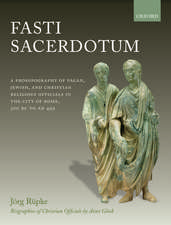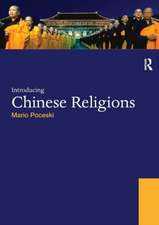Japanese Religions and Globalization: Routledge Studies in Asian Religion and Philosophy
Autor Ugo Dessìen Limba Engleză Paperback – 21 aug 2015
The book highlights how, paradoxically, these processes of religious hybridization may be closely intertwined with the promotion of cultural chauvinism. It shows how on the one hand religion in Japan is engaged in border negotiation with global subsystems such as politics, secular education, and science, and how on the other hand, it tries to find new legitimation by addressing pressing global problems such as war, the environmental crisis, and economic disparities left unsolved by the dominant subsystems.
A significant contribution to advancing an understanding of modern Japanese religious life, this book is of interest to academics working in the fields of Japanese Studies, Asian history and religion and the sociology of religion.
| Toate formatele și edițiile | Preț | Express |
|---|---|---|
| Paperback (1) | 383.63 lei 6-8 săpt. | |
| Taylor & Francis – 21 aug 2015 | 383.63 lei 6-8 săpt. | |
| Hardback (1) | 1057.75 lei 6-8 săpt. | |
| Taylor & Francis – 26 feb 2013 | 1057.75 lei 6-8 săpt. |
Din seria Routledge Studies in Asian Religion and Philosophy
-
 Preț: 377.87 lei
Preț: 377.87 lei -
 Preț: 341.19 lei
Preț: 341.19 lei -
 Preț: 381.21 lei
Preț: 381.21 lei -
 Preț: 385.08 lei
Preț: 385.08 lei -
 Preț: 436.14 lei
Preț: 436.14 lei -
 Preț: 416.22 lei
Preț: 416.22 lei -
 Preț: 385.84 lei
Preț: 385.84 lei -
 Preț: 481.05 lei
Preț: 481.05 lei -
 Preț: 436.14 lei
Preț: 436.14 lei -
 Preț: 428.85 lei
Preț: 428.85 lei -
 Preț: 389.38 lei
Preț: 389.38 lei - 26%
 Preț: 819.67 lei
Preț: 819.67 lei -
 Preț: 384.86 lei
Preț: 384.86 lei - 18%
 Preț: 1000.27 lei
Preț: 1000.27 lei -
 Preț: 400.77 lei
Preț: 400.77 lei - 18%
 Preț: 1005.04 lei
Preț: 1005.04 lei - 14%
 Preț: 338.33 lei
Preț: 338.33 lei - 14%
 Preț: 299.52 lei
Preț: 299.52 lei -
 Preț: 413.18 lei
Preț: 413.18 lei - 14%
 Preț: 299.52 lei
Preț: 299.52 lei - 48%
 Preț: 571.48 lei
Preț: 571.48 lei - 16%
 Preț: 272.83 lei
Preț: 272.83 lei -
 Preț: 389.38 lei
Preț: 389.38 lei -
 Preț: 411.04 lei
Preț: 411.04 lei - 18%
 Preț: 1057.09 lei
Preț: 1057.09 lei - 18%
 Preț: 1000.27 lei
Preț: 1000.27 lei - 16%
 Preț: 310.28 lei
Preț: 310.28 lei - 18%
 Preț: 1001.55 lei
Preț: 1001.55 lei - 18%
 Preț: 1000.27 lei
Preț: 1000.27 lei
Preț: 383.63 lei
Nou
Puncte Express: 575
Preț estimativ în valută:
73.42€ • 79.72$ • 61.67£
73.42€ • 79.72$ • 61.67£
Carte tipărită la comandă
Livrare economică 22 aprilie-06 mai
Preluare comenzi: 021 569.72.76
Specificații
ISBN-13: 9781138934887
ISBN-10: 1138934887
Pagini: 200
Dimensiuni: 156 x 234 x 13 mm
Greutate: 0.32 kg
Ediția:1
Editura: Taylor & Francis
Colecția Routledge
Seria Routledge Studies in Asian Religion and Philosophy
Locul publicării:Oxford, United Kingdom
ISBN-10: 1138934887
Pagini: 200
Dimensiuni: 156 x 234 x 13 mm
Greutate: 0.32 kg
Ediția:1
Editura: Taylor & Francis
Colecția Routledge
Seria Routledge Studies in Asian Religion and Philosophy
Locul publicării:Oxford, United Kingdom
Public țintă
PostgraduateCuprins
Introduction 1. The Risk of Cultural Bias: Definitions and Phases 2. 'One True World Religion Among Many Others'? 3. Shaping New Glocal Identities 4. Glocalization, Cultural Chauvinism, and Resistance to Change 5. Glocalization Overseas 6. Carriers of Globalization 7. Border Negotiation in Global Society (1): Religion and Politics 8. Border Negotiation in Global Society (2): Religion, Education and Science 9. Addressing Global Problems 10. Conclusion
Notă biografică
Ugo Dessì is a lecturer at the Institute of Religious Studies at the University of Leipzig, Germany. He has published widely on Shin Buddhism and Japanese religions.
Recenzii
"Dessi’s volume constitutes an indispensable reference that is already bearing fruit (see the recent contributions in Amstutz and Dessi 2014)." - Girardo Rodriguez Plasencia Ritsumeikan Asia Pacific University
"Dessi’s solid grounding in the Japanese-language scholarship on religion and globalization in Japan, such as by Inoue Nobutaka and Shimazono Susumu, together with his careful incorporation of works by Western scholars of globalization offer an insightful bridge between English-language and Japanese-language scholarship on religion and globalization. Altogether, this book is an excellent introduction to theories of religion and globalization from both Japanese and non-Japanese perspectives and offers the reader a broad window into the various institutional dynamics that shape the ways Japanese religions are articulated with and active agents within global discourses." - Isaac Gagné, Waseda University, Japan
"Dessi’s solid grounding in the Japanese-language scholarship on religion and globalization in Japan, such as by Inoue Nobutaka and Shimazono Susumu, together with his careful incorporation of works by Western scholars of globalization offer an insightful bridge between English-language and Japanese-language scholarship on religion and globalization. Altogether, this book is an excellent introduction to theories of religion and globalization from both Japanese and non-Japanese perspectives and offers the reader a broad window into the various institutional dynamics that shape the ways Japanese religions are articulated with and active agents within global discourses." - Isaac Gagné, Waseda University, Japan
Descriere
This book analyzes the variety of ways through which Japanese religions (Buddhism, Shintō, and new religious movements) contribute to the dynamics of accelerated globalization in recent decades. It looks at how Japanese religions provide material to cultural global flows, thus acting as carriers of globalization, and how they respond to these flows by shaping new glocal identities.















